Aller Conjugation in All 8 French Tenses
Aller in French is one of the most frequently used verbs in French. The meaning of aller is “to go”.
This article gives you aller conjugations in the most common indicative tenses of the French language, as well as some hints on how you would use them in everyday speech. This article will also help you to learn correct grammar so your speech and communication skills in French become top notch!
Why only the 8 indicative tenses? Because those are the tenses you’ll hear when practicing your French! There are 13 other tenses but they have more to do with mood and some intent. On top of that they’re rarely used, so even if you’re an intermediate or advanced French learner then the indicative 8 are ALL you need!
Before you continue: Corrector provides a free tool to help you correct grammar and spelling in any language (including conjugations)! Just click here to access it!
French Tenses for Aller Conjugation
- Présent. Something that is happening now. This can either be ongoing or instant. Eg: I go. / I’m going.
- Imparfait (imperfect). Used to describe ongoing, continual or habitual past events. Eg: I was going.
- Passé simple is not common and normally found in formal or literary contexts. If you’re a beginner or even intermediate French learner then you can safely ignore it for now (but it’s still included below for convenience). Eg: I went.
- Passé composé. Widely used to talk about completed past actions. Eg: I went.
- Futur simple (simple future) is used when you intend to describe a general future state of being. Eg: I will go. Once again, beginners can generally ignore this conjugation as there’s a much simpler version (next in list) that will suffice for now.
- Futur proche (near future) describes an upcoming action. In English this would be “I am going to go …“. This should be your go to future tense when learning conjugations.
- Plus-que-parfait (pluperfect). This tense indicates that an action had taken place and was completed before another past action took place. Eg: I went before eating my meal.
- Passé antérieur is not common at all (just like passé simple), and again is found in formal or literary contexts. Eg: I had gone.
- Futur antérieur (future perfect) is used to describe a future action that will be completed in the future before another action is started. For example: I will have gone before eating breakfast.
Mastering the conjugation of “aller” in at least 3 tenses (present, passé composé and futur proche is essential for becoming proficient in French. In fact I would concentrate on these 3 and only study the others when they come up in literature or other contexts.
Aller Présent Conjugation (Present):
| Pronoun | Conjugation | English Translation |
|---|---|---|
| je | vais | I go |
| tu | vas | you go (singular) |
| il/elle | va | he/she goes |
| nous | allons | we go |
| vous | allez | you go (plural) |
| ils/elles | vont | they go |
Usage: The Présent tense for aller conjugation is used to express actions that are happening now or general truths. It is one of the most frequently used tenses in everyday language, as most of life is int he present! In literature, the Présent tense is also commonly used in dialogues to create a sense of immediacy and make the story more engaging. The English equivalent of the Présent tense is the simple present tense.
Example Sentences:
- Je vais au cinéma ce soir. (I’m going to the cinema tonight.)
- Tu vas à la plage demain. (You are going to the beach tomorrow.)
- Ils vont à l’école tous les jours. (They go to school every day.)
Aller Imparfait Conjugation (Imperfect):
| Pronoun | Conjugation | English Translation |
|---|---|---|
| j’ | allais | I used to go |
| tu | allais | you used to go (singular) |
| il/elle | allait | he/she used to go |
| nous | allions | we used to go |
| vous | alliez | you used to go (plural) |
| ils/elles | allaient | they used to go |
Imparfait Tense Usage: The Imparfait tense is used to describe ongoing or repeated actions, in the past. It is commonly used in everyday language to talk about past habits or continuous actions. In literature, the Imparfait is extensively used to narrate events and provide background information. The English equivalent of the Imparfait tense is the past continuous or past progressive tense. Although sometimes English shortens it to the general form “went”.
Example Sentences:
- J’allais souvent à la bibliothèque. (I used to go to the library often.)
- Ils allaient à l’école en bus. (They used to go to school by bus.)
- Tu allais chez ton grand-père. (You used to go to your grandfather’s place.)
Aller Passé Simple Conjugation (simple past / preterite):
| Pronoun | Conjugation | English Translation |
|---|---|---|
| j’ | allais | I went |
| tu | allas | you went (singular) |
| il/elle | alla | he/she went |
| nous | allâmes | we went |
| vous | allâtes | you went (plural) |
| ils/elles | allèrent | they went |
Usage: The Passé simple tense is mainly used in written and formal French, particularly in literature, historical texts, and storytelling. It describes completed actions in the past and is rarely used in everyday spoken language. If you’re a newbie to French then you can safely ignore this tense for now. The English equivalent of the Passé simple tense is the simple past tense or preterite.
Example Sentences:
- J’allais tôt le matin. (I went early in the morning.)
- Elle alla à Paris l’année dernière. (She went to Paris last year.)
- Nous allâmes au restaurant hier soir. (We went to the restaurant last night.)
Aller Passé Composé Conjugation (Present Perfect):
| Pronoun | Conjugation | English Translation |
|---|---|---|
| je | suis allé(e) | I went |
| tu | es allé(e) | you went (singular) |
| il/elle | est allé(e) | he/she went |
| nous | sommes allé(e)s | we went |
| vous | êtes allé(e)(s) | you went (plural) |
| ils/elles | sont allé(e)s | they went |
Usage: The Passé composé tense is commonly used to talk about completed actions in the past. It’s the most frequently used past tense in everyday language for spoken and informal written communication. The English equivalent of the Passé composé tense is the present perfect tense. It’s the tense you use most often in English to describe the past.
Example Sentences:
- Je suis allé(e) au marché ce matin. (I went to the market this morning.) pronunciation is the same regardless.
- Ils sont allés au cinéma hier soir. (They went to the cinema last night.)
- Nous sommes allé(e)s à la fête d’anniversaire. (We went to the birthday party.)
Note: The (e) is added on if you’re female – but pronunciation is exactly the same as the male versions.
Aller Futur Simple Conjugation (Future):
| Pronoun | Conjugation | English Translation |
|---|---|---|
| j’ | irai | I will go |
| tu | iras | you will go (singular) |
| il/elle | ira | he/she will go |
| nous | irons | we will go |
| vous | irez | you will go (plural) |
| ils/elles | iront | they will go |
Usage: The Futur simple tense is used to express actions that will happen in the future. While it is used in everyday language, it’s not as common as other present and past tenses. You can safely ignore it for now! The English equivalent of the Futur simple tense is the simple future tense.
Example Sentences:
- J’irai à la plage demain. (I will go to the beach tomorrow.)
- Tu iras à la fête samedi soir. (You will go to the party on Saturday night.)
- Ils iront en vacances l’année prochaine. (They will go on vacation next year.)
Aller Futur Proche Conjugation (Near Future):
| Pronoun | Conjugation | English Translation |
|---|---|---|
| je | vais aller | I am going to go |
| tu | vas aller | you are going to go (singular) |
| il/elle | va aller | he/she is going to go |
| nous | allons aller | we are going to go |
| vous | allez aller | you are going to go (plural) |
| ils/elles | vont aller | they are going to go |
Usage: The Futur Proche tense is used to express immediate or near-future actions. It’s commonly used in everyday language as a simpler way to express future intentions or plans compared to the Futur simple tense. The English equivalent of the Futur Proche tense is the near future tense (going to + verb).
Example Sentences:
- Je vais aller faire les courses. (I am going to go grocery shopping.)
- Ils vont aller au restaurant ce soir. (They are going to go to the restaurant tonight.)
- Nous allons aller au cinéma après le dîner. (We are going to go to the cinema after dinner.)
Aller Plus-que-parfait Conjugation (Pluperfect):
| Pronoun | Conjugation | English Translation |
|---|---|---|
| j’ | étais allé(e) | I had gone |
| tu | étais allé(e) | you had gone (singular) |
| il/elle | était allé(e) | he/she had gone |
| nous | étions allé(e)s | we had gone |
| vous | étiez allé(e)(s) | you had gone (plural) |
| ils/elles | étaient allé(e)s | they had gone |
Usage: The plus-que-parfait is used to describe an action that occurred before another action in the past. It somewhat corresponds to the English past perfect tense but not always! It’s kind of a uniquely French thing that strictly puts one action before another, best seen by example 2 below. The English equivalent of the Plus-que-parfait tense is the past perfect tense.
Example Sentences:
- J’étais déjà allé(e) à Paris avant. (I had already gone to Paris before.)
- Il était allé à l’école avant que la pluie ne commence. (He had gone to school before it started raining.)
- Nous étions allé(e)s au musée avant la fermeture. (We had gone to the museum before it closed.)
Aller Passé Antérieur Conjugation (Past Infinitive):
| Pronoun | Conjugation | English Translation |
|---|---|---|
| je | fus allé(e) | I had gone |
| tu | fus allé(e) | you had gone (singular) |
| il/elle | fut allé(e) | he/she had gone |
| nous | fûmes allé(e)s | we had gone |
| vous | fûtes allé(e)(s) | you had gone (plural) |
| ils/elles | furent allé(e)s | they had gone |
Usage: For aller conjugations the Passé Anterior tense is a literary tense used in formal writing, particularly in literature and historical texts. It is similar in meaning to the Plus-que-parfait tense but is considered more archaic and MUCH less commonly used.
English Equivalent: The English equivalent of the Passé Anterior tense is the past perfect tense.
Example Sentences:
- Je fus allé(e) à cette exposition avant. (I had gone to that exhibition before.)
- Ils furent allés au château avant la tombée de la nuit. (They had gone to the castle before nightfall.)
- Nous fûmes allé(e)s à la campagne après le déjeuner. (We had gone to the countryside after lunch.)
Aller Futur Antérieur Conjugation (Future Perfect):
| Pronoun | Conjugation | English Translation |
|---|---|---|
| je | serai allé(e) | I will have gone |
| tu | seras allé(e) | you will have gone (singular) |
| il/elle | sera allé(e) | he/she will have gone |
| nous | serons allé(e)s | we will have gone |
| vous | serez allé(e)(s) | you will have gone (plural) |
| ils/elles | seront allé(e)s | they will have gone |
Usage: The Futur Antérieur tense is used to express actions that will be completed in the future before another future event. It is more commonly used in formal writing and literature than in everyday spoken language.
English Equivalent: The English equivalent of the Futur Antérieur tense is the future perfect tense.
Example Sentences:
- Je serai allé(e) chez le médecin avant de te rendre visite. (I will have gone to the doctor before visiting you.)
- Ils seront allés au magasin avant la fermeture. (They will have gone to the store before closing time.)
- Nous serons allé(e)s à l’aéroport avant le départ de l’avion. (We will have gone to the airport before the plane’s departure.)
Aller Conjugation Table Images (FREE to Download)
To download a file of all the aller conjugations click here. Alternatively click the images below for a full size version for you to keep, free of charge!
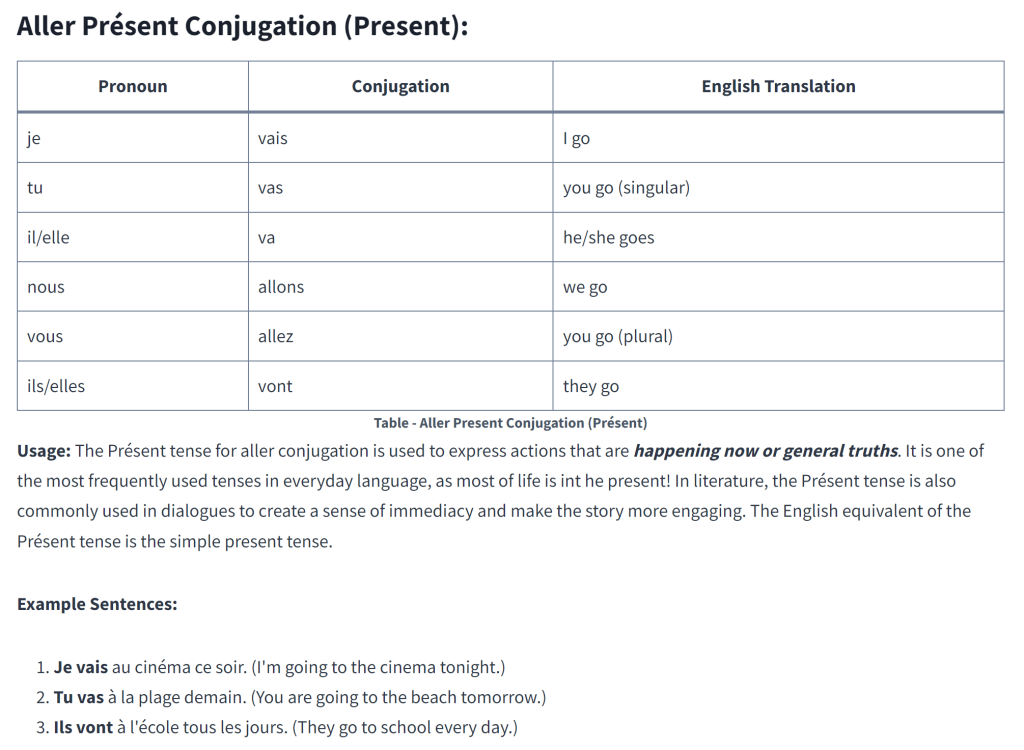
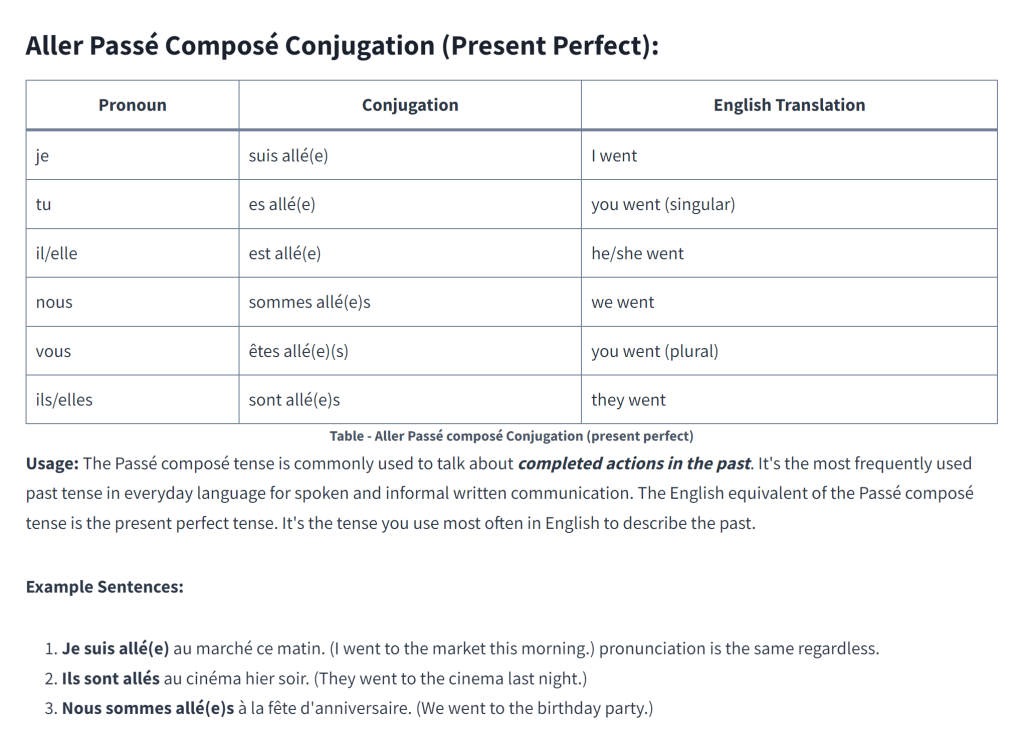
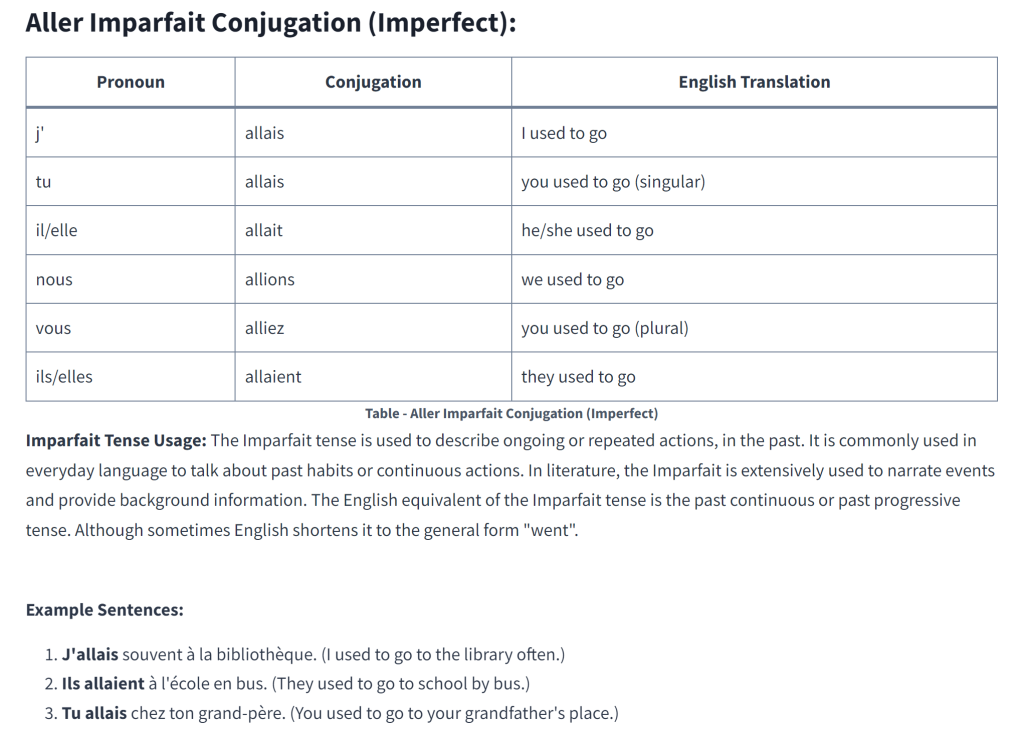
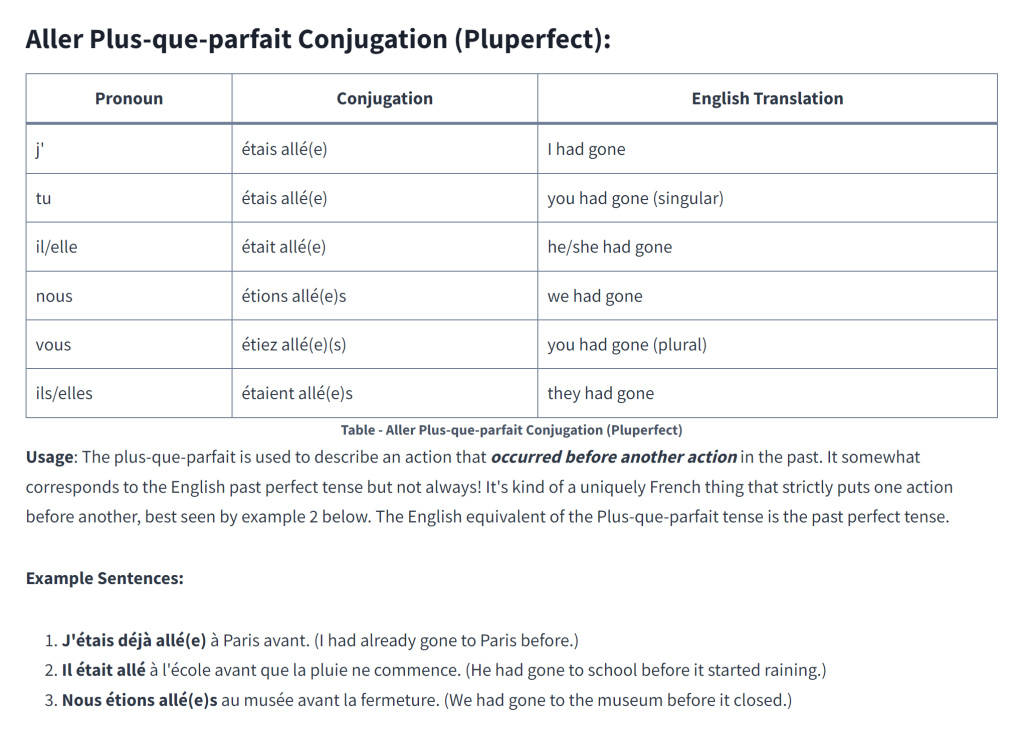
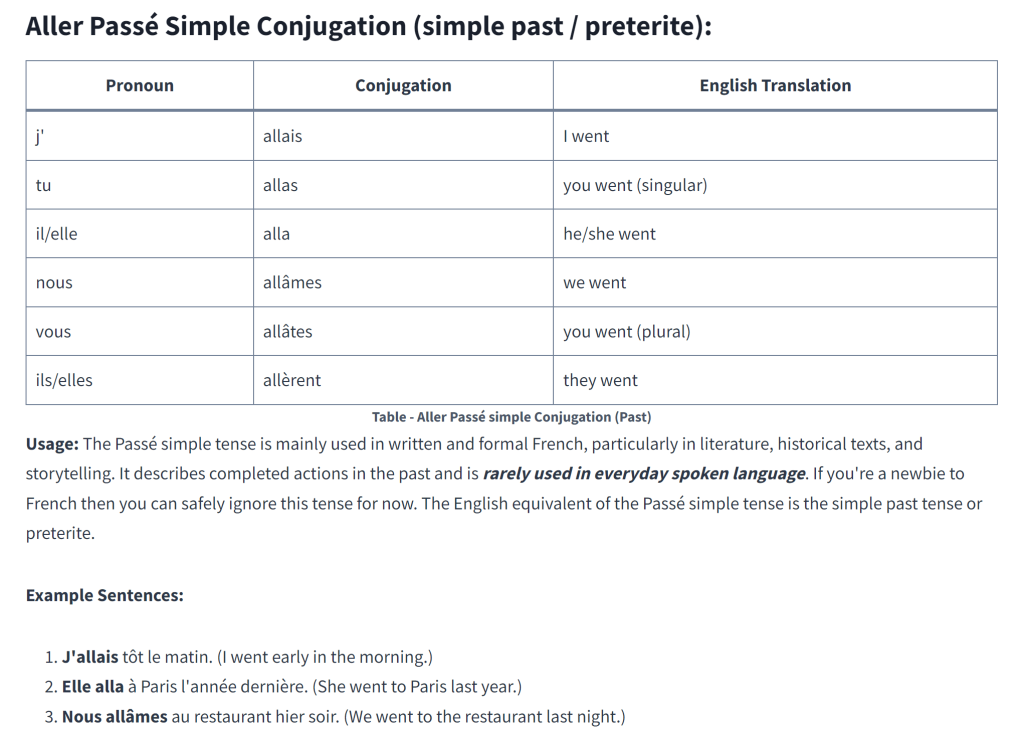
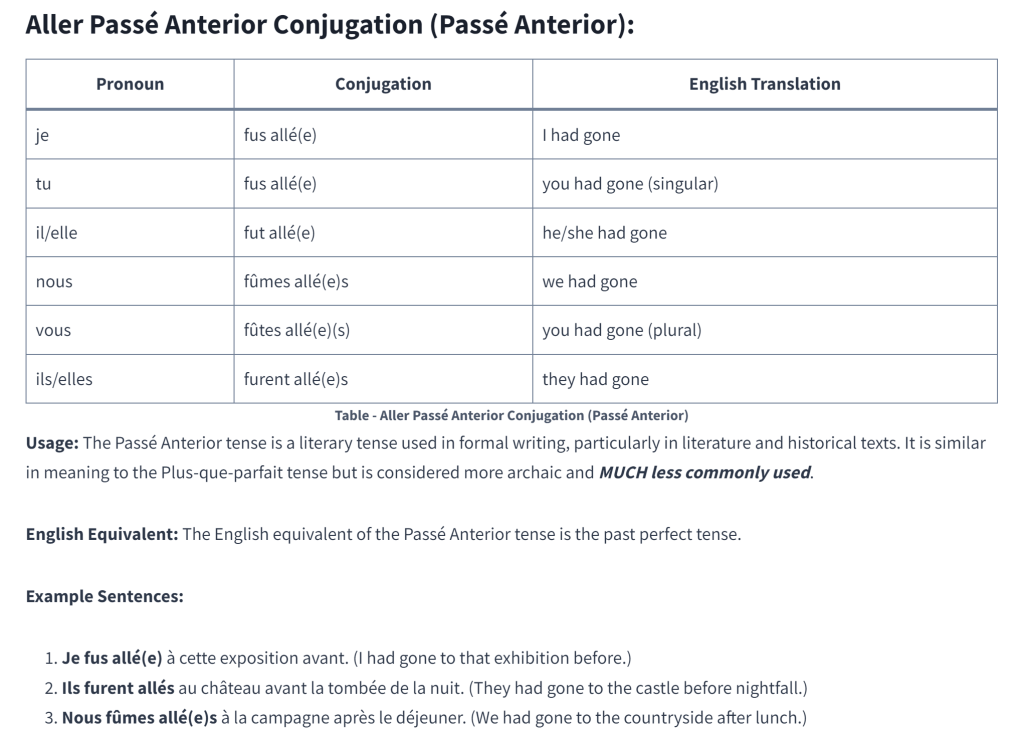
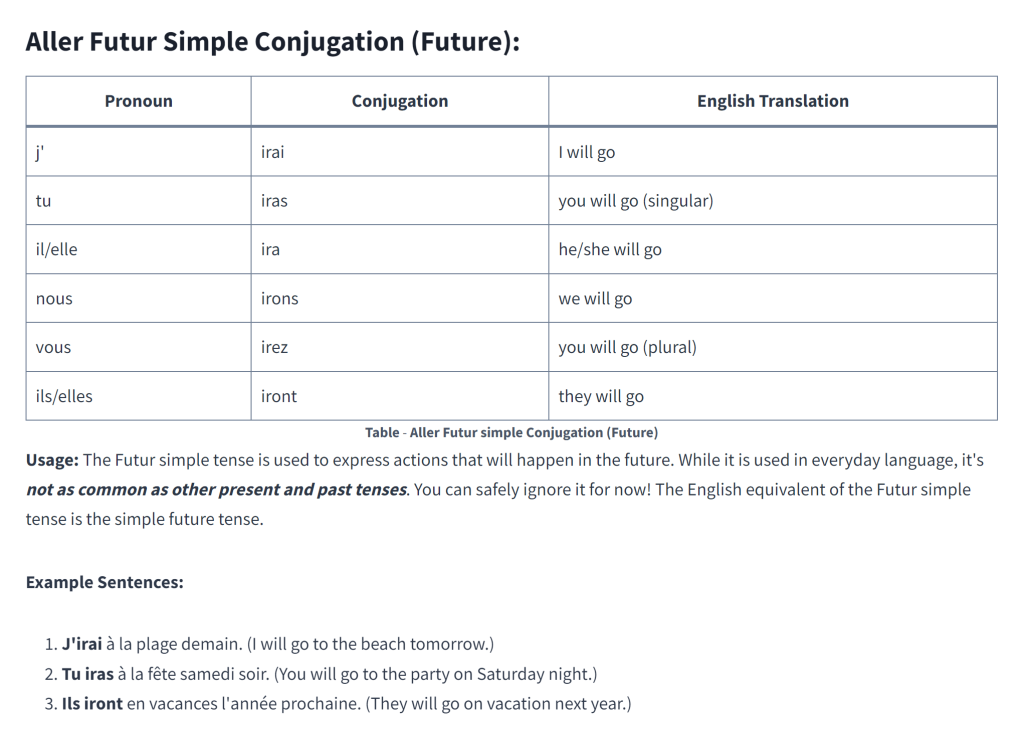
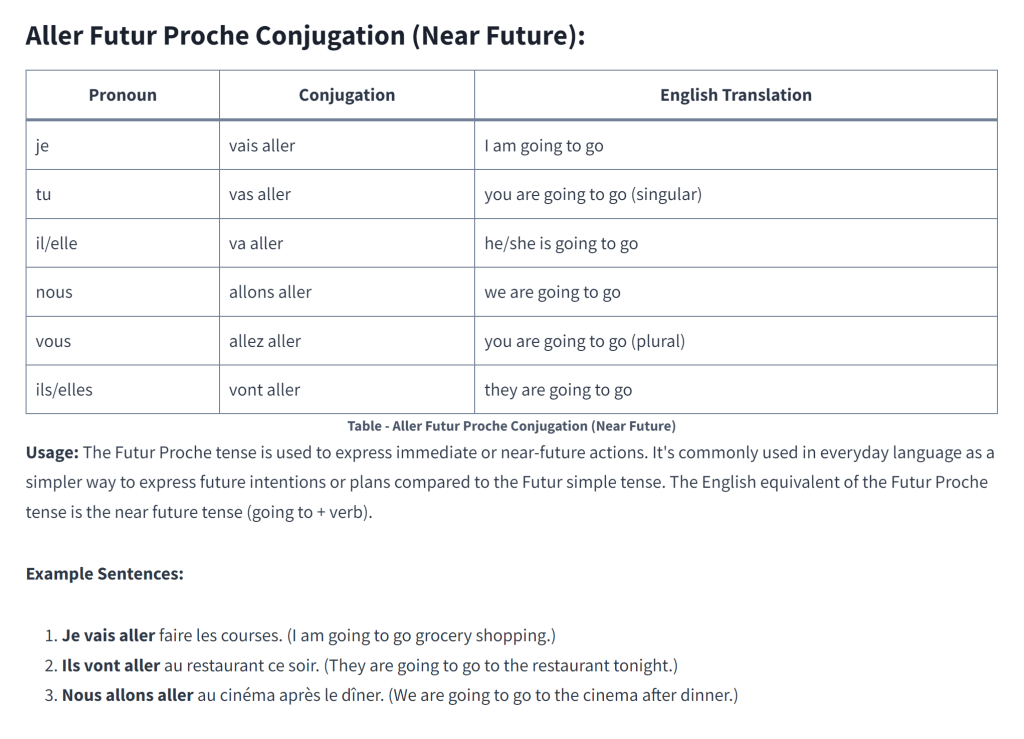
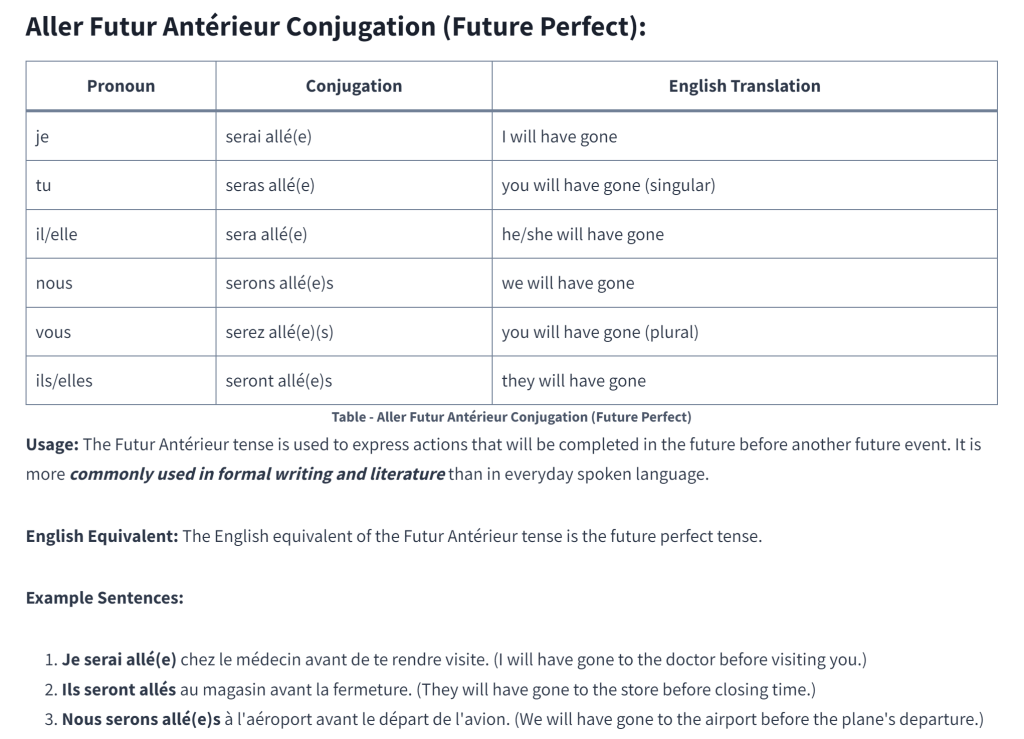
Wrap up
The verb aller conjugations aren’t too difficult to learn as long as you stick to present, futur proche and imparfait tenses. You can safely ignore the others for now (but do come back when you’re happily proficient in French).
If you’d like to read more about French verbs, conjugation and tenses then check out this article on how to master French verb conjugations. Lot’s of great tips in there if you’re struggling!
Other French Verb Conjugations You May be Interested In
We don’t only have aller conjugations! Here are some others you may want to check out! Also, check out this link which tells you the history of the word.
